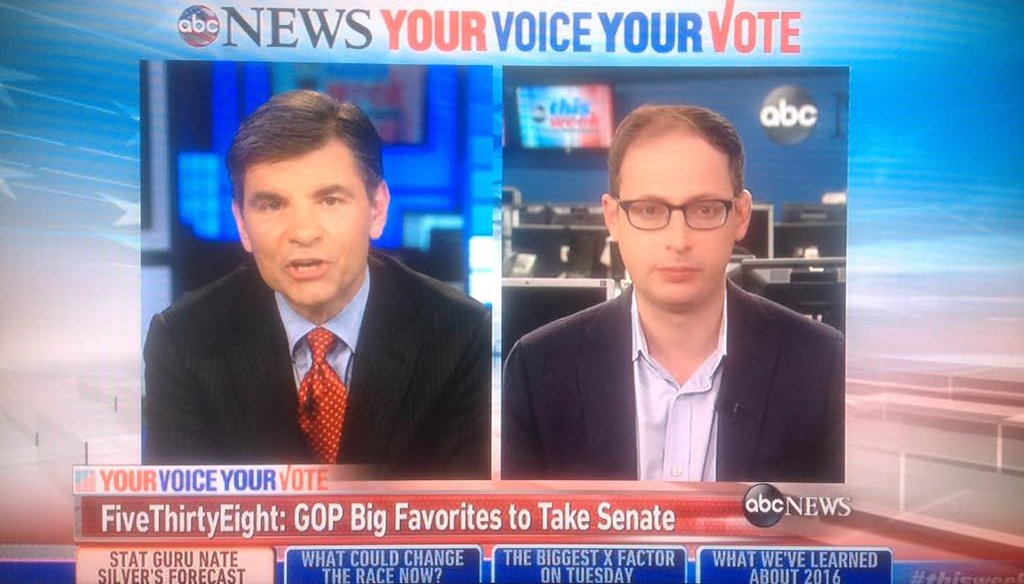Get PolitiFact in your inbox.

Nate Silver said Sunday that Republicans have greater than a 70 percent shot of taking control of the Senate.
The prevailing wisdom among pundits is that Republicans will win enough seats in Tuesday’s midterm election to gain control of the U.S. Senate. On Sunday, Nate Silver of ESPN’s FiveThirtyEight pegged the likelihood of a GOP takeover at more than 70 percent.
That would be a rare feat, explained Republican National Committee spokesman Sean Spicer, because it would mean the GOP successfully ousted several incumbents.
"The last time we beat more than two (incumbents in the U.S. Senate) was 1980," Spicer said on CNN’s State of the Union.
This year, Democratic incumbents in Alaska, Colorado, Arkansas, New Hampshire, Louisiana and North Carolina all could conceivably lose.
If they did, it would make a bit of recent history. Spicer’s claim rates True.
We looked at past Senate election results and found that Republicans have had some successful gains in the past 35 years, but many of those wins were in races for an open seat when a Democratic senator was retiring.
In 1980, Republicans took 12 Democrat Senate seats. (Nine incumbents lost in the general election, while three lost in their primaries.) Spicer’s correct to say they haven’t beat more than two incumbents since then.
From 1981 on, Republicans have beaten only 12 incumbent Democrats for Senate seats. Republicans’ biggest Senate gains in that time frame all involve taking open seats -- such as 1994, 2004 and 2010 when they gained four, five and six open seats, respectively.
Senate Democrats haven’t had quite the same struggle against Republican incumbents in recent years. From 1981 on, they’ve beaten 37 incumbents total.
While the prognosticators predict bad news generally for Democrats on Tuesday, there is a glimmer of hope for Democrats in an unlikely place -- Kansas.
There, incumbent Republican Sen. Pat Roberts finds himself in a close contest against independent Greg Orman. On ABC’s This Week, ABC White House correspondent Jonathan Karl dubbed Roberts the worst candidate of 2014.
"There’s a clear worst candidate this year. It’s Pat Roberts," Karl said. "I mean, Kansas has not elected somebody other than a Republican (to the U.S. Senate) since before The Wizard of Oz hit the movie theaters."
We won’t pass judgment on Roberts’ candidacy. But Karl is right about Kansas’ long history of sending Republicans to the Senate. Karl’s claim rates True.
The classic film that opens with a tornado sweeping through a Kansas farm made its debut 75 years ago in 1939. The last time Kansans sent a Democrat to represent them in the U.S. Senate?
1932.
The last Democratic senator the state sent to Washington was George McGill, a lawyer from Wichita who served from 1930 to 1939. After winning a 1932 election, McGill lost his 1938 re-election bid.
The only other Democratic senators from Kansas were John Martin, who filled out the remainder of a deceased senator’s term from 1893-95, and William Howard Thompson, who served from 1913-19, according to the Biographical Directory of the U.S. Congress.
For an incumbent such as Roberts to be in such a vulnerable position is highly unusual, said Burdett Loomis, professor of political science at the University of Kansas. Winning a seat in the U.S. Senate from Kansas has been mostly very easy for Republicans. The GOP has long dominated all layers of Kansas politics, with the state last voting for a Democratic candidate for president in 1964 (Lyndon B. Johnson).
"In that context, it’s just very weird because this is about as favorable an environment for a Republican as you can get," Loomis said, "and it’s also supposed to be a good year for Republicans across the country."
Our Sources
See individual fact-checks.
















































